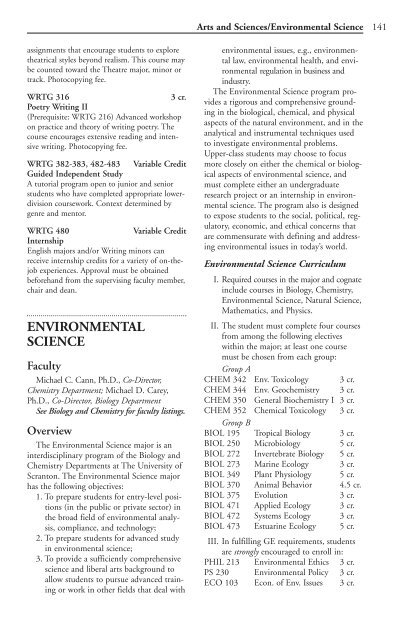2003-2004 - The University of Scranton
2003-2004 - The University of Scranton
2003-2004 - The University of Scranton
Create successful ePaper yourself
Turn your PDF publications into a flip-book with our unique Google optimized e-Paper software.
assignments that encourage students to explore<br />
theatrical styles beyond realism. This course may<br />
be counted toward the <strong>The</strong>atre major, minor or<br />
track. Photocopying fee.<br />
WRTG 316 3 cr.<br />
Poetry Writing II<br />
(Prerequisite: WRTG 216) Advanced workshop<br />
on practice and theory <strong>of</strong> writing poetry. <strong>The</strong><br />
course encourages extensive reading and intensive<br />
writing. Photocopying fee.<br />
WRTG 382-383, 482-483 Variable Credit<br />
Guided Independent Study<br />
A tutorial program open to junior and senior<br />
students who have completed appropriate lowerdivision<br />
coursework. Context determined by<br />
genre and mentor.<br />
WRTG 480 Variable Credit<br />
Internship<br />
English majors and/or Writing minors can<br />
receive internship credits for a variety <strong>of</strong> on-thejob<br />
experiences. Approval must be obtained<br />
beforehand from the supervising faculty member,<br />
chair and dean.<br />
ENVIRONMENTAL<br />
SCIENCE<br />
Faculty<br />
Michael C. Cann, Ph.D., Co-Director,<br />
Chemistry Department; Michael D. Carey,<br />
Ph.D., Co-Director, Biology Department<br />
See Biology and Chemistry for faculty listings.<br />
Overview<br />
<strong>The</strong> Environmental Science major is an<br />
interdisciplinary program <strong>of</strong> the Biology and<br />
Chemistry Departments at <strong>The</strong> <strong>University</strong> <strong>of</strong><br />
<strong>Scranton</strong>. <strong>The</strong> Environmental Science major<br />
has the following objectives:<br />
1. To prepare students for entry-level positions<br />
(in the public or private sector) in<br />
the broad field <strong>of</strong> environmental analysis,<br />
compliance, and technology;<br />
2. To prepare students for advanced study<br />
in environmental science;<br />
3. To provide a sufficiently comprehensive<br />
science and liberal arts background to<br />
allow students to pursue advanced training<br />
or work in other fields that deal with<br />
Arts and Sciences/Environmental Science 141<br />
environmental issues, e.g., environmental<br />
law, environmental health, and environmental<br />
regulation in business and<br />
industry.<br />
<strong>The</strong> Environmental Science program provides<br />
a rigorous and comprehensive grounding<br />
in the biological, chemical, and physical<br />
aspects <strong>of</strong> the natural environment, and in the<br />
analytical and instrumental techniques used<br />
to investigate environmental problems.<br />
Upper-class students may choose to focus<br />
more closely on either the chemical or biological<br />
aspects <strong>of</strong> environmental science, and<br />
must complete either an undergraduate<br />
research project or an internship in environmental<br />
science. <strong>The</strong> program also is designed<br />
to expose students to the social, political, regulatory,<br />
economic, and ethical concerns that<br />
are commensurate with defining and addressing<br />
environmental issues in today’s world.<br />
Environmental Science Curriculum<br />
I. Required courses in the major and cognate<br />
include courses in Biology, Chemistry,<br />
Environmental Science, Natural Science,<br />
Mathematics, and Physics.<br />
II. <strong>The</strong> student must complete four courses<br />
from among the following electives<br />
within the major; at least one course<br />
must be chosen from each group:<br />
Group A<br />
CHEM 342 Env. Toxicology 3 cr.<br />
CHEM 344 Env. Geochemistry 3 cr.<br />
CHEM 350 General Biochemistry I 3 cr.<br />
CHEM 352<br />
Group B<br />
Chemical Toxicology 3 cr.<br />
BIOL 195 Tropical Biology 3 cr.<br />
BIOL 250 Microbiology 5 cr.<br />
BIOL 272 Invertebrate Biology 5 cr.<br />
BIOL 273 Marine Ecology 3 cr.<br />
BIOL 349 Plant Physiology 5 cr.<br />
BIOL 370 Animal Behavior 4.5 cr.<br />
BIOL 375 Evolution 3 cr.<br />
BIOL 471 Applied Ecology 3 cr.<br />
BIOL 472 Systems Ecology 3 cr.<br />
BIOL 473 Estuarine Ecology 5 cr.<br />
III. In fulfilling GE requirements, students<br />
are strongly encouraged to enroll in:<br />
PHIL 213 Environmental Ethics 3 cr.<br />
PS 230 Environmental Policy 3 cr.<br />
ECO 103 Econ. <strong>of</strong> Env. Issues 3 cr.
















